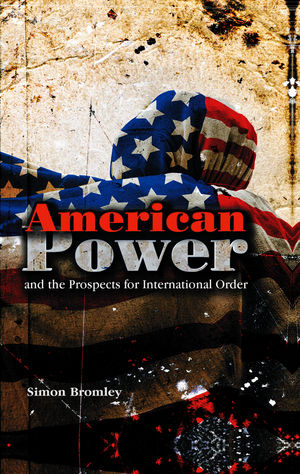American Power and the Prospects for International OrderISBN: 978-0-7456-4238-3
Hardcover
288 pages
August 2008, Polity
 Other Available Formats: Paperback
|
||||||
Australian Journal of Political Science
"Walt Rostow's theory of modernization, in Bromley's view,
supplemented the requirement of containing Soviet military power
with the need to 'create forms of coordinated economic
interdependence, based on the replication of the American model of
capitalism in the rest of the capitalist world, from which many
states could derive positive benefit'. Bromley elucidates this
argument in an excellent first chapter and goes on to demonstrate
how the neo-conservative foreign policy agenda both builds on this
foundation and departs from it."
Political Studies Quarterly
"This is a good book and should be recommended in particular to
those who think they already know everything about American foreign
relations."
Times Higher Education
"Simon Bromley is one of the most knowledgeable, astute and
sober analysts of the role of oil in the making of the American
empire. This new book confirms this amidst a broader examination of
the American strategy and ideology from the post-war era up to
today."
Leo Panitch, York University, Toronto
"Simon Bromley has written an exceptional book, remarkable for
its many insights, and the lucidity and balance of its judgements
on the role the United States plays in the world and the complex
nature of its power. Avoiding the oversimplifications and
caricatures which bedevil this field, Bromley offers a compelling
account of the enduring dilemmas which have shaped American policy
towards the international order and the current challenges it
faces. This book should be read by everyone interested in
understanding contemporary world politics."
Andrew Gamble, University of Cambridge
"Simon Bromley has crafted an excellent and thought-provoking study
of American power. He presents a robust defence of an American-led
liberal international order that will need to be taken into account
by all other writers on the subject. His argument that the US is a
revolutionary power seeking to mould the world into its own image
because of its declining economic power is a challenging one.
Summing up and defending a liberal thesis, Bromley does something
unusual (at least for a European scholar): he defends American
power. Bromley's study should be widely read by political
scientists, political economists, political historians, and
international relations scholars and students."
Inderjeet Parmar, University of Manchester



